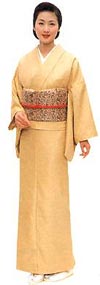|
Japanese Clothing Kimono Fabric, Kimono Pattern & How to Make a Kimono Kimono Patterns & Kimono Styles Japanese Obi & How to Tie an Obi Sash Japanese Yukata - The Summer Kimono How to wear a Kimono Robe and Japanese Robes Japanese Shoes & Japanese Sandal Types Happi Coats & Japanese Festival Clothing
|
Japanese Clothing - Clothes Japanese clothing and traditional japanese clothes much like U.S. clothing is worn to compliment the seasons. The traditional forms of Japanese clothing in general is called wafuku. Japanese clothing and japanese clothes are worn also based off a persons age or by the event.
Japanese Clothing -
Japanese Clothes and
Seasons
Japanese Clothing -
Japanese Clothes and
Events Formal japanese clothing normally takes on either of two characteristics; very elaborate designs or a simple elegant designs. A few examples of elaborate designed japanese clothes worn for an event are uchikake wedding kimono and festive happi coats. The more elegant designs, subdued colors or solid pattern formal japanese clothes would be worn for paying formal visits, funerals or by married women for weddings or formal functions.
Japanese Clothing -
Japanese Clothes and
Age
Traditional Japanese
Clothing Types Kimono - meaning clothing or things to wear is the basic japanese clothing Yukata - the summer kimono Nagajugan - undergarments Clothing Accessories - obi, shoes, socks, etc. Haori - short silk jackets Michiyuki - Overcoats Hakama - japanese pants Uchikake - most formal kimono Shiro-maku - wedding kimono
|

